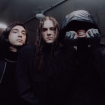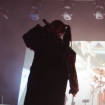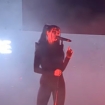For most of her life, Poppy lived with a pain in her throat. It was a dull pain made duller by the fact it seemed to have no origin and no expiration date. It followed her through adolescence, early adulthood; for years, it showed no sign of going away. She tried to convey her discomfort to those around her, but the cry was chronic — like complaining about the weather on an island that gets 365 days of rain.
A few years ago, she took the pain to a spiritual healer, who finally revealed its source: the pain was the result of not speaking up.
As she retells this story, Poppy lets out a very slight gasp — as though the revelation just jolted her awake, like it was coming to her anew. "Since that conversation, I've always tried to make a point of speaking up," she says, "under any circumstance."
Speaking today, Poppy's voice is half-throated, slightly timid and bears a very faint Southern drawl from her teenage years living in Nashville. It's the voice of someone braced to answer a series of questions about her life and art from a total stranger. At first, her voice quavers, but it soon settles to a steady frequency. She disguises any apprehension with amicability. She laughs when I laugh. She speaks with consideration and gentleness. She is — in her own graceful way — speaking up.
It's been almost 10 years since the artist, born Moriah Rose Pereira, scored her first record deal with Island Records and became Poppy: a project that's trailed a seesawing narrative of capture and emancipation; silencing and screaming back. Once a standout denizen of surreal YouTube, she's since become a celebrated musician in her own right, leading the 2020s nu-metal resurgence, garnering 100 million-plus streams and views and becoming the first solo female artist nominated for a Best Metal Performance Grammy (for "BLOODMONEY" from 2020's stellar I Disagree).
Poppy is currently on a career leveling-up tour, opening for alternative icons Jane's Addiction and Smashing Pumpkins, in support of her powerful new EP, Stagger (her first for new label Lava Records/Republic Records). She'd met Billy Corgan and his family for the first time only days prior. "They're very sweet," she tells Revolver. Today, she's… Wait, where is she? "That's a good question, let me pull up the map. Harrisonburg, Virginia." Traveling across the States, each night she's bringing Poppy to an entirely new audience, playing in stadiums she used to sneak into with friends as a teenager, earning new fans in real time.
The stage is her own insular universe, but occasionally she'll notice the star-glint of mobile phone flashes from the crowd. "A lot of people don't know about me and then as the set progresses, it's really fun to see more cell phones get lifted up and people getting more into the music," she says. "Opening for such iconic bands, there's a sort of peace. I don't feel like my nerves get in the way. I feel very present and happy to be there."
Today is a day off for the bands. Every day, but especially on tour, Poppy's routine is unwaveringly strict. She wakes at 6 a.m., goes to the gym, practices yoga and prepares for her set. Post-show, she immediately winds down after coming offstage, gets into her pajamas as early as she can, and begins her "sleep technique." What is her sleep technique? "Melatonin," she says. She sleeps well.
Poppy's beginning to eat well, too. She enjoys eating; a relatively new sensation for her. For years, she maintained a vegan diet, but that wrought muscle deficiencies. (Poppy also doesn't like the word "diet," and grasps for another one — "eating technique?") She acknowledges that some might be upset to hear she's no longer vegan: a lifestyle she refers to as a "different kind of discipline," a discipline she found unsustainable. Today, she eats a paleo-leaning "technique."
Now that she's speaking up, she's better able to listen to the needs of her mind, body and spirit. "I think I wasn't very kind to myself for a while," she says. "I've been trying to listen to myself more, whether on the food side of things, in the athletics, in relationships."
Poppy's been on a self-care kick for the past year; ever since she was made to hurtle away from the East Coast back towards Los Angeles following the sudden end of a "very toxic relationship." Stagger, her latest EP, was written in the immediate aftermath of this dissolution. It's her most deliberate act of speaking up yet.
Stagger's four songs, which draw from a "musical bed" of trip-hop, prog-rock and riot-grrrl influences, play out like karmic retribution. Across the EP, Poppy casts herself in opposition to someone who "staggers backwards through life" while she progresses; a glutton who fucks and betrays, while she calmly, graciously lives out her truth; an oppressor who tries to confine and miniaturize others, while she lives a life of questioning, curiosity and perpetual expansion. It's also worth noting that while Stagger is clearly informed by Poppy's recent "toxic relationship" — it's also a broader, more universal statement that draws from all her relationships with men up to this point, including a much-publicized former partnership with a well-known trap-metal star.

"I realized I was under such a great deal of stress that I was internally dying. My body was rejecting things. It was bad," she says. "There's nothing I did that I regret because I know that I tried my best. And if anything, I was able to dig deeper into myself … and maybe that's all the relationship was worth. It was a lesson in how to hold your hardline and get back to yourself."
Poppy, to be sure, has landed back on her feet. Today, her ceaseless curiosity is matched only by her cat Pi, a furless chocolate sphynx, who was born on Christmas Day, 2017, and has recently developed a penchant for yogurt. ("He got into some the other day, it was all over his face.") Pi has been traveling alongside Poppy for almost five years, a firm (possibly evil) confidant and tour companion. He sleeps by Poppy on her tour bus and runs around in the roomy backstage areas. Their next pitstop is Salem, where the two of them will spend Halloween alongside Poppy's family, exploring haunted houses in the area. "I love haunted houses," she says. "My family used to run one."
Poppy was born in Boston on the first day of the year in 1995. She was planned. She doesn't remember her first word. She does, however, remember her first Halloweens. As the youngest of the family, she played the "child role" in her parents' haunted houses. "They were very noisy and very scary," she says, "but we weren't allowed to touch anyone; that would be a violation." When she wasn't acting alongside her siblings in the haunted houses, her mother, a seamstress, would dress her in cutesy costumes. One year she was a loaf of Wonder Bread, the next a firefly, then Waldo, then a roaming gnome.
From a young age, Poppy developed a curiosity for fear. In their haunted houses, her parents had created a living taxonomy of horrors. "Playing off peoples' fears is interesting because some people are afraid of the dentist; some people are afraid of bees, some of blood and needles," she says. "Certain things I laughed at; certain things scared me."

As a child, Poppy's greatest fear was her own voice. "I think I was so afraid of my voice because I was afraid of people looking at me; I didn't think that what I had to say was important."
Scared to take up space, Poppy took up an observer role instead. She didn't have many people who understood her. The friends she did have were older, further along in their "life journey." Being an observer made her an extra-sensitive child, someone more porous to the world. It's a role she still plays today. "I've always taken that position," she says. "In any sort of relationship with people, I tend to take the backseat, to observe … I want to collect more information before coming to a conclusion."
While we're on the topic, Poppy takes care to point out that being an observer isn't merely a passive role. "I don't want it to be misconstrued with not being a leader," she clarifies. "I would say that I'm a leader as well as an observer. I think that it requires a certain character to be a mesh of both things. One doesn't outweigh the other."
Poppy's role as observer was more pronounced during the first half of her musical career, when she emerged into popular consciousness ashen-haired and waxlike, as a kind of YouTube satirist who reflected the strangeness of the platform back to itself. Her first video, uploaded to her channel in November 2014, was called "Poppy Eats Cotton Candy," and it depicted her doing just that. The following year, she released her most infamous video, "I'm Poppy," in which she repeated that phrase over and over for 10 minutes. This introduction to Poppy was half stupefying, half sublime. It shocked you into the present with sheer boredom. It was made of a sweetness that also suggested a dour and disturbing undertone, like a K-pop star, a David Lynch film or a pack of prank candy. It also inspired an antsy curiosity: Who was Poppy? Where had she come from? What was she trying to do?
The question that dogged Poppy most during this stage of her career was whether she was playing a character. But to ask was to miss the point. Poppy's art not only denaturalized fame — but also life as a human being among other human beings; all the absurd and arbitrary ways in which we try to relate to each other. "Is yours a special voice?" she retorted back to an L.A. news presenter in 2018, who asked whether she put on a voice for the camera. "It kind of is," the presenter said. Like Andy Warhol before her, Poppy was drawing attention to the mundane performance of our daily lives — a performance that only a keen observer could see and appreciate.
Take a purely superficial scan of Poppy's trajectory and you'll see that hair has played a significant, recur-ring role in her evolution. Hair is Poppy's harbinger of change. In October 2019, she dyed her platinum blonde hair a dark burgundy brown and signed to Sumerian Records (home to the likes of Sleeping With Sirens and Animals as Leaders) — signaling a move away from the deliberately artificial and android musical world of Poppy 1.0, towards the reflective, introspective performance of authenticity that has come to define Poppy 2.0.
"I think as an artist it's your responsibility to change," she says. "I don't think there's anything entirely linear about my project. It's full of zigzags and ups and arounds and loops. I just follow where my curiosity takes me."
Poppy is remarkably strong-spirited: a marauding soul who honors the sharp turns and painful metamorphoses that come with being alive. (Last year's progressive rock and shoegaze-inspired full-length album Flux was about exactly that.) In both her life and her art, Poppy will throw herself off the edge of the cliff whenever she experiences a fork in the road. "Sometimes it requires you to break your own heart but then you learn from it," she says. "I think that what I learned more recently is that slowing down is really important and that there isn't really an end goal. It's good to have goals. But if you're trying to get to the end — the end is death, and death is forever. It's important to live right now. It's a fight to do that every day. But I'm learning in real time."
It's one of many lessons that have come from the aftermath of Stagger, an EP she wrote as soon as she landed back in L.A.
Immediately after pulling into LAX, she called her guitarist and producer Ted Gowans. "I said I had to write these songs. We just had to do it." For a period of two weeks, she'd write and "talk his ear off." She lifted lyrics straight from a journal, writing her songs like a flare-up. Within the fortnight, Poppy had written 15 songs which detailed "subject matter that I will not return to ever again in my life," she says. "I wrote out some lessons for myself and hopefully other people can take what I learned and not have to deal with any similar events."

I ask whether she can say any more about these "events." She takes a sip of water, swallows awkwardly. "Yes, lightly," she says. "I was accepting unacceptable things for longer than I should have. I was putting my needs in the background. Ultimately, I tried to save somebody that didn't want to be saved. It was a hard lesson and I'm glad it's over and I'm glad the chapter is done."
Now that Poppy's recent painful era has concluded, she's ready to develop into something entirely new. She has transitioned from Sumerian to Republic Records ("not many people can say they've had four record deals") and is working on the full-length follow-up to Stagger. She's also looking ahead to another hair dye-job. On the set for this cover shoot, she considered switching from burgundy to blonde. "We ended up going black for Revolver, but we're right at the cusp of the change that I've been planning for a while."
Poppy reveals little about this upcoming change, only that the new music is "unlike anything I've ever done" and that it will "visually fit with the blonde hair color and a turning of a new chapter." She confirms that a new album will be out sometime in 2023.
In the meantime, she readies herself for another night screaming and speaking up for herself to a crowd of thousands. She takes a breath as our interview comes to an end, sips on her water, clears a throat that is now free of pain.
Hair and Makeup: Jaime Diaz; Styling: Heather Picchiottino; Styling Assistant: Lucy Sylvester








